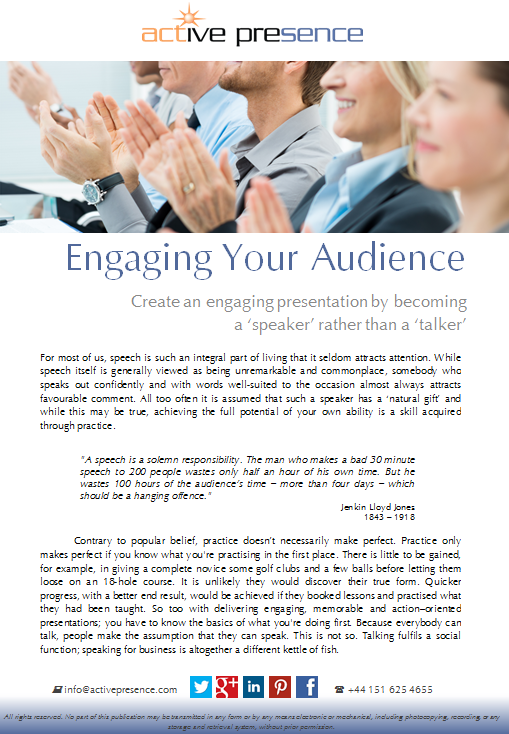Engaging Your Audience
Follow these simple tips and create an engaging presentation by becoming a ‘speaker’ rather than a ‘talker’
For most of us, speech is such an integral part of living that it seldom attracts attention. While speech itself is generally viewed as being unremarkable and commonplace, somebody who speaks out confidently and with words well-suited to the occasion almost always attracts favourable comment. All too often it is assumed that such a speaker has a ‘natural gift’ and while this may be true, achieving the full potential of your own ability is a skill acquired through practice.
“A speech is a solemn responsibility. The man who makes a bad 30 minute speech to 200 people wastes only half an hour of his own time. But he wastes 100 hours of the audience’s time – more than four days – which should be a hanging offence.”
Contrary to popular belief, practice doesn’t necessarily make perfect. Practice only makes perfect if you know what you're practising in the first place. There is little to be gained, for example, in giving a complete novice some golf clubs and a few balls before letting them loose on an 18-hole course. It is unlikely they would discover their true form. Quicker progress, with a better end result, would be achieved if they booked lessons and practised what they had been taught. So too with delivering engaging, memorable and action–oriented presentations; you have to know the basics of what you're doing first. Because everybody can talk, people make the assumption that they can speak. This is not so. Talking fulfils a social function; speaking for business is altogether a different kettle of fish.
When it comes to engaging your audience, how do you become a ‘speaker’ rather than a ‘talker’?
Knowledge: To create and deliver an engaging presentation, subject matter expertise is clearly important. The audience has a right to expect that you know what you're talking about. While this ought to be a given – something that the audience can take for granted - it's nowhere near enough. Some of the most boring speakers around are unquestionably subject matter experts, university lecturers being a prime example.
Confidence: A speaker who appears both competent in his or her subject and comfortable on stage exudes confidence. That confidence represents the apogee of performance for many people required to speak regularly at business events or social occasions.
Audience engagement: Successfully engaging your audience often requires interaction. Speakers displaying high levels of confidence frequently interact with the audience as part of their performance, without such interaction appearing to drag them off course, or interrupt their flow or timing.
Natural delivery: As with almost any field of endeavour, apparently natural performers make everything look so easy. The keyword in here is ‘apparently’. Creating an engaging presentation is not as difficult as it may seem. People who are not natural performers can appear to be so by following a regime of good practice and rehearsal. In fact, even natural performers spend time with their script, making sure that their delivery is well rehearsed.
Well-prepared: Hoping that everything will be all right on the night is not a recommended performance plan. It's true that some people do indeed fly by the seat of their pants and manage to get away with it. It's a short-term and high risk strategy. Engaging your audience, for the most part, requires intricate performance planning because it enables you, simply, to deliver a better performance.
Like this page? Share it here...

